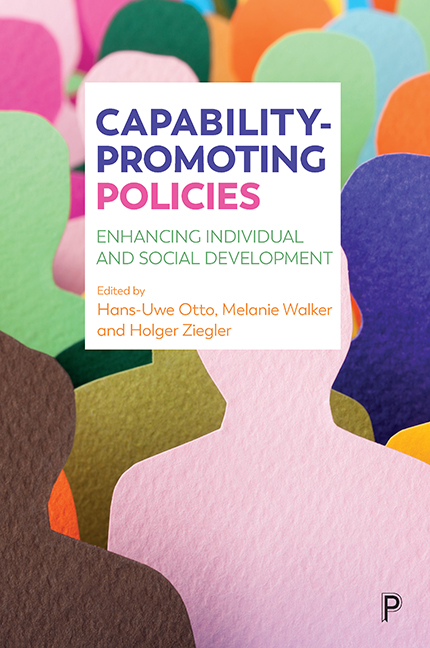Eight - The third sector and capability-promoting policies
Published online by Cambridge University Press: 12 April 2022
Summary
Introduction: research questions and methodology
By adopting the capability approach as a basic framework to analyse social phenomena, this chapter disentangles the role of third sector associations at the local level in increasing social innovative processes by enabling the integration of groups otherwise excluded from the labour market (for example, disadvantaged young people). This participatory research at the micro level focused on two urban areas Giambellino in Milan and Scampia in Naples where the most disadvantaged among the young population are concentrated. In these areas, the unemployed rates are higher than elsewhere in Italy.
In this chapter, we argue that social innovation can be produced by a capability-promoting approach of intermediate actors, bringing about an enhanced capacity of disadvantaged persons to define their aspirations or to be able to aspire. The aim of our research is to show how limited the third sector actors’ participation has been both at the meso and micro levels in recent years with respect to policies aimed at contrasting youth unemployment. We try to verify whether this derives from low levels of social innovation on the part of third sector associations or can be attributed to other factors, such as lack of administrative capacity, poor policy design, socioeconomic conditions, youth disengagement and so on. More specifically, we worked on the following dimensions involved in the capability approach: inequality and disadvantages, participation and aspirations.
Inequality and disadvantage represent two key issues in the capability accounting of individual wellbeing and both are meant as intrinsically multidimensional concepts. The capability approach acknowledges that people's available opportunities are affected by both initial endowments and subsequent influential contingencies. Indeed, given one's resources, diverse personal, socioeconomic and environmental conditions can affect differently the extent and type of real opportunities available to people. These sources of variation, in terms of available resources, individual characteristics and heterogeneity of socioeconomic and geographical contexts, play a major role in generating inequality in capabilities as well as in functionings space and should be taken into account when analysing and designing public policy (see Spreafico et al, 2016).
A better understanding of the plurality of both personal and ‘environmental’ circumstances and how they interrelate can be particularly helpful for detecting potential sources of disadvantage that prevent individuals from fulfilling their own needs and aspirations.
- Type
- Chapter
- Information
- Capability-Promoting PoliciesEnhancing Individual and Social Development, pp. 145 - 160Publisher: Bristol University PressPrint publication year: 2017



